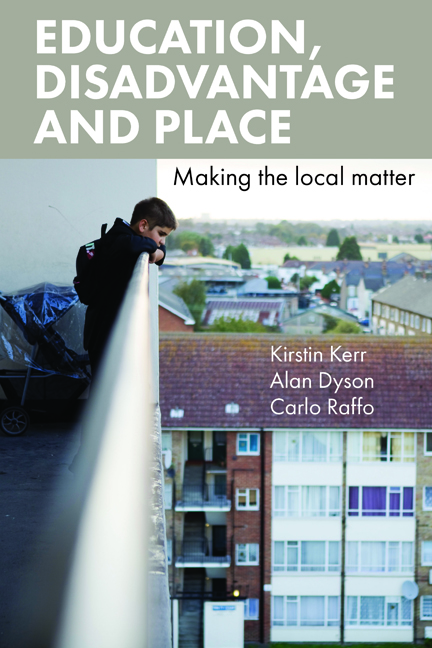Book contents
- Frontmatter
- Contents
- List of tables and figures
- Notes on authors
- Acknowledgements
- one Introduction
- two Why place matters in education
- three Local education systems as products of place: a case study
- four Learning from the past
- five Learning from the present
- six A rationale for a new generation of area-based initiatives
- seven Developing understandings of place as a basis for intervention
- eight Evaluation and monitoring
- nine Governance and accountability
- ten Children and places in hard times: some concluding thoughts
- References
- Index
ten - Children and places in hard times: some concluding thoughts
Published online by Cambridge University Press: 25 February 2022
- Frontmatter
- Contents
- List of tables and figures
- Notes on authors
- Acknowledgements
- one Introduction
- two Why place matters in education
- three Local education systems as products of place: a case study
- four Learning from the past
- five Learning from the present
- six A rationale for a new generation of area-based initiatives
- seven Developing understandings of place as a basis for intervention
- eight Evaluation and monitoring
- nine Governance and accountability
- ten Children and places in hard times: some concluding thoughts
- References
- Index
Summary
At the core of this book is an assumption that place matters in relation to educational disadvantage – but that why it matters, and what kinds of action it calls for, can be understood in very different ways. On one understanding, place matters because disadvantaged people appear in higher concentrations in some places than in others. Where these concentrations are highest, educational outcomes overall are poor, schools and other educational institutions typically struggle to cope with the challenges they face, and other services typically struggle to support both educators and learners as well as they might hope. Not surprisingly, policymakers looking at this situation have often tried to do something different in such places. By targeting additional resources at them, encouraging local innovation, requiring new forms of provision or imposing distinctive accountabilities, policymakers have tried to solve or ameliorate the problems of disadvantaged places in the expectation that this will somehow play a part in promoting greater educational and social equality.
As we have seen, the achievements of education-focused area-based initiatives (ABIs) of this kind have been somewhat limited. As with similar ABIs with a regeneration or other non-educational focus, they have had some modest successes, but these have tended to be short-lived and have stopped well short of bringing about major transformations in the lives of disadvantaged people or the characteristics of disadvantaged places. What, in Chapter One, we called their ‘minimal’ conceptualisations – of how disadvantage is produced in particular places and the kinds of actions that might be needed to tackle this – ensure that their impacts can only be of a strictly limited kind.
However, we have also seen that there are other, more ‘maximal’, conceptualisations emerging locally, on the ground. These seek to understand places in terms of the complex social and economic processes that work within and through them to create and perpetuate disadvantage. They see disadvantage as produced and reproduced differently in different places, but also see each place as subject to processes that come from beyond its boundaries and operate on a national and global scale. Crucially, they see interventions to tackle disadvantage as needing to work not simply on its manifestations – on poor attainment outcomes, attendance or staying-on rates, for instance – but also on those underlying processes.
- Type
- Chapter
- Information
- Education, Disadvantage and PlaceMaking the Local Matter, pp. 187 - 200Publisher: Bristol University PressPrint publication year: 2014



